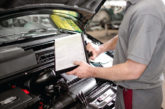
The Motor Ombudsman’s annual service and repair sector survey has highlighted the main challenges workshops are set to face in 2024.
The Motor Ombudsman’s annual poll of independent garages and workshops has revealed businesses across the UK’s service and repair sector are set to encounter a number of challenges this year. Research conducted by the Ombudsman for the automotive sector showed three-quarters of vehicle repairers expect day-to-day running costs, energy bills, and taxes to have the biggest impact on their bottom line in 2024. In addition, more expensive parts are also likely to pose an additional concern for nearly two-thirds (58%) of those questioned.
Recruiting qualified staff, which was a hurdle last year for just over half (54%) of respondents who took part in the latest study, are set to remain a difficulty for a similar proportion (58%) of businesses throughout the coming months, as demand for skilled technicians outstrips available supply in the labour market, especially when it comes to those trained in the maintenance of electric vehicles (EVs).
With household purse strings already tightened, due to the widely-publicised cost of living pressures, and with high interest rates and household bills unlikely to subside in the shorter term, the survey points to the fact around half of garages and workshops will encounter the scenario where consumers are choosing to put off essential vehicle repairs in a bid to save money. In the same vein, a reduction in the number of customers being able to afford routine vehicle maintenance, such as servicing, is a likely to be seen by 49% of businesses in 2024.
Faced with such a trading environment, this brings a balancing act between raising prices for garages and workshops to remain profitable, but not so much it has a negative impact on customer demand and footfall. In fact, 54% of respondents in The Motor Ombudsman survey said that they will try to refrain from passing on higher operating costs in what they charge back to vehicle owners for replacement components and work undertaken. In addition, with all these factors at play, close to a third of survey participants (29%) foresee customer retention being a harder task this year, than last.
Meanwhile, the study equally highlighted around a quarter of vehicle repairers are also predicting they will be impacted by, EVs providing less scope for additional revenue-generating opportunities and billing for replacement parts, customers abandoning their cars on-site if repairs provide too costly and uneconomical based on the age of the vehicle, and being able to generate new custom in an era where consumer spending is already stretched.
The Motor Ombudsman’s Managing Director and Chief Ombudsman, Bill Fennell, said: “Our annual survey is a barometer of business sentiment in the service and repair sector, and is designed to showcase what garages and workshops have seen first-hand in the year just gone, and to paint a picture of what lies ahead in this area of the motor industry in the coming 12 months.”
Bill continued: “It is clear to see from our study that this sector is not immune from what is happening in the wider economic environment. This has presented a series of hurdles that garages and workshops will need to navigate, most notably rising costs, which of course, has a ripple effect right across the consumer and business spectrum. Repairers being innovative and having the flexibility to adapt is therefore crucial, as is standing out from the crowd with accreditation to The Motor Ombudsman.”
The Motor Ombudsman’s research also highlighted there are positives to be taken away from the results, with businesses saying, despite the difficulties hiring staff, 53% still plan to invest in this area, while over a third will look to make improvements to their premises, to create an improved customer experience. Similarly, 34% are seeking to put more resources into EV equipment and learning.









